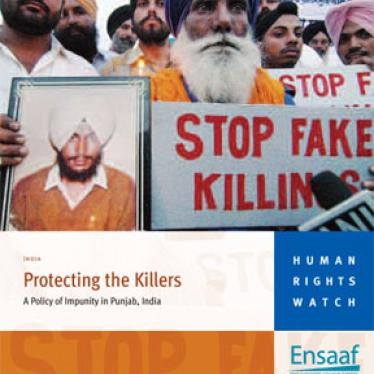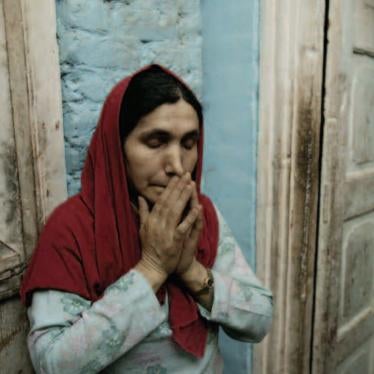(New Delhi) – Indian authorities should immediately open an independent, transparent, and credible investigation into the unmarked graves discovered in Jammu and Kashmir state, Human Rights Watch said today. An inquiry by the police investigation team of the Jammu and Kashmir State Human Rights Commission (SHRC) has found 2,730 bodies dumped into unmarked graves in four of the state’s 14 districts. Thousands of Kashmiris have been forcibly disappeared during the last two decades of violence, their whereabouts unknown.
The Enquiry Report of Unmarked Graves in North Kashmir, submitted by the investigating police team to the commission on July 2, 2011, said that the unidentified bodies had been buried in 38 sites in north Kashmir’s Baramulla, Bandipora, Handwara, and Kupwara districts. At least 574 have been identified as the bodies of local Kashmiris. The government had previously said that the graves held unidentified militants, most of them Pakistanis killed over the two decades of violence in Jammu and Kashmir whose bodies had been handed over to village authorities for burial. However, in response to commission inquiries, in March 2010 district police claimed that a total of 464 unidentified bodies had been buried in north Kashmir.
“For years, Kashmiris have been lamenting their lost loved ones, their pleas ignored or dismissed as the government and army claimed that they had gone to Pakistan to become militants,” said Meenakshi Ganguly, South Asia director at Human Rights Watch. “But these graves suggest the possibility of mass murder. The authorities should immediately investigate each and every death.”
According to the Srinagar-based Association of Parents of Displaced Persons (APDP), at least 8,000 people have disappeared since the insurgency began. In February 2003, the government of Jammu and Kashmir, then led by the current opposition leader, Mufti Mohammad Sayeed, told the state legislative assembly that 3,744 people were missing and that many of those reported missing since 1990 were actually in Pakistan, where they had signed up to be trained as militants.
Human Rights Watch and other human rights groups have repeatedly called for an independent investigation into allegations of unlawful killings and enforced disappearances by Indian security forces. In a September 2006 report, “Everyone Lives in Fear,” Human Rights Watch said: “The debate about the facts and the inconclusive nature of government and NGO claims make it clear why the government or a specially designated independent body should conduct a transparent investigation into each case of ‘disappearance’ reported since 1990.”
The commission’s report, which was leaked to journalists over the weekend, is the first official confirmation that such deaths occurred. Pointing out that Kashmiri groups, including APDP and the International People’s Tribunal on Kashmir, have said there are similar unmarked graves in at least eight other districts, the report recommended a thorough investigation by an “impartial agency,” and at least $15,000 in compensation for each death. The Jammu and Kashmir state government and the central government in New Delhi have yet to respond to the findings.
When the new government of chief minister Omar Abdullah was elected in Jammu and Kashmir state in February 2009, Human Rights Watch wrote to him, saying: “Thousands of people remain victims of enforced disappearances in Jammu and Kashmir. The practices of ‘disappearances’ and extrajudicial executions violate basic human rights, including the right to life, the right to liberty and security of the person, the right to a fair and public trial, as well as the prohibition on torture and cruel, inhuman, and degrading treatment or punishment. Under international law, an enforced disappearance is a continuing crime until the ‘disappearance’ is resolved.”
The enquiry report recommended that the commission call for immediate DNA sampling and other forensic tests to try to identify the bodies by matching them with the next of kin of people who have disappeared. Seventeen of the bodies found in the four districts have already been reburied by relatives in family graveyards. The investigation found that 18 of the graves contained more than one body.
Human Rights Watch has previously called for creation of an independent, transparent commission working within a specified time frame to which relatives and others can provide information about cases of enforced disappearance. This commission should be empowered to summon members of the security forces who might have been responsible, even if they are no longer posted in Jammu and Kashmir or have retired from service.
“The government has long been well aware that widespread killings and disappearances have occurred in Kashmir, but it has looked the other way,” Ganguly said. “The discovery of these unidentified bodies will make it impossible to continue the long cover-up of the facts or to deny justice to the families of victims.”
A similar pattern of abuses and cover-up took place in the neighboring state of Punjab during counterinsurgency operations from 1984 to 1995, Human Rights Watch said. Indian security forces were implicated in thousands of killings and secret cremations to hide the evidence.
The National Human Rights Commission, which was specially empowered by the Supreme Court to address these cases, narrowed its efforts to merely establishing the identity of the people secretly cremated in three crematoria in just one district of Punjab. It rejected cases from other districts and ignored intentional violations of human rights by India’s security forces. For more than a decade, the commission has failed to investigate a single case independently, and it refuses to identify any officials responsible for the abuses.
None of the key architects of the counterinsurgency strategy in either Kashmir or Punjab who bear substantial responsibility for these atrocities have been brought to justice.
“The fact that the investigation in Jammu and Kashmir has taken place and led to the confirmation of these unmarked graves is encouraging, but as in Punjab the Indian government and security establishment have a long record of failing to hold anyone accountable for these deaths,” Ganguly said. “The government now has the opportunity to deliver justice by prosecuting those responsible.”
Human Rights Watch also urged the immediate repeal of the Armed Forces Special Powers Act [AFSPA], a draconian law that grants the military widespread powers to arrest people without warrant and to shoot to kill. This law has enabled security forces to engage in crimes such as enforced disappearances, Human Rights Watch said. It protects military personnel responsible for serious crimes from prosecution, creating a pervasive culture of impunity.
“Even some senior government and judicial figures believe that the AFSPA leads to abuses and offends human rights principles,” Ganguly said. “If the government is serious about justice, it needs to get rid of AFSPA immediately.”








